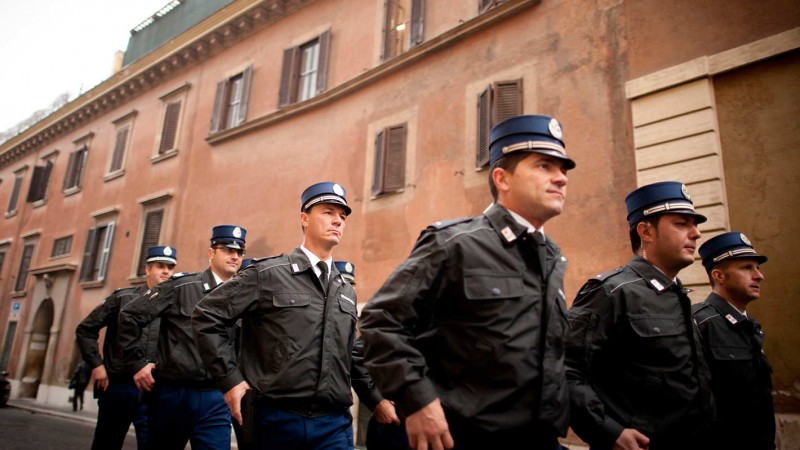(ZENIT News / Rome, 08.30.2024).- The Vatican City, though best known as the spiritual and administrative heart of the Roman Catholic Church, is also a unique sovereign state governed by its own civil laws. Despite its small size and population, this city-state is rigorously safeguarded, both physically and legally, under a set of stringent regulations that define its borders, citizenship, and residency.
A Fortress City Protected by Ancient Walls
Encircled by the imposing Leonine Walls, the Vatican City’s borders stretch approximately 3.2 kilometers, marking the boundary between the state and Italy. These walls, dating back to the 9th century, rise 14 meters high, serving as a formidable defense for the world’s smallest independent nation. Despite its size, the Vatican maintains a strong sense of sovereignty, with these ancient fortifications symbolizing its enduring independence.
An Army and Police Force in a Tiny Nation
The Vatican’s military might may be modest, but it is not without defense. The Swiss Guard, with its 104 soldiers, stands as the smallest and one of the most iconic armies in the world. Armed not just with their traditional halberds but also with modern firearms, these guards are responsible for the protection of the Pope and the Vatican’s borders. Alongside them, the 130-strong Vatican Gendarmerie handles internal security, maintaining public order and even functioning as the judicial police. Given the Vatican’s population of just 764 people as of the 2023 census, this means the state boasts an unparalleled ratio of security personnel to citizens.

A Highly Exclusive Citizenship
Vatican citizenship is a rare status, tightly controlled and highly coveted. According to official records, only 618 individuals hold Vatican citizenship, making it the most exclusive in the world. Even fewer—just 64—possess the state’s official passports. The majority of these citizens do not reside within the Vatican’s walls but are instead dispersed globally, often in diplomatic service. Only 264 people actually live within the Vatican, including the Pope, a handful of cardinals, and the Swiss Guard.
Stringent Rules Governing Residency and Citizenship
In May 2023, Pope Francis approved a new Fundamental Law for the Vatican City State, reinforcing strict criteria for citizenship and residency. This law stipulates that Vatican citizens include the Pope, cardinals residing in the state, and individuals whose roles are essential to the Vatican’s functions. Residency, similarly, is granted under tight conditions and can be revoked at any time, underscoring the transient nature of living within the Vatican.
Marriage and family ties offer no guarantees for continued residency, with the law stating that permissions for spouses and children cease under specific circumstances, such as annulment or separation. Furthermore, children of Vatican citizens lose their citizenship upon reaching adulthood, unless specific conditions are met.

Tight Controls on Access and Immigration
The Vatican’s approach to immigration and access is one of the strictest in Europe, reflecting its need to safeguard its small population and the sanctity of its grounds. Unauthorized immigration is not tolerated, and all access to the Vatican is carefully controlled. The laws governing entry are explicit: permits are required and strictly regulated, with access only granted for specific, justified reasons.
In alignment with Catholic teaching, the Vatican upholds the principle that civil authorities may regulate immigration in the interest of the common good, a stance echoed by Pope John Paul II in his calls to prevent illegal immigration and combat exploitation.
English adaptation of an article originally published in the Spanish edition of ZENIT.
Thank you for reading our content. If you would like to receive ZENIT’s daily e-mail news, you can subscribe for free through this link.



